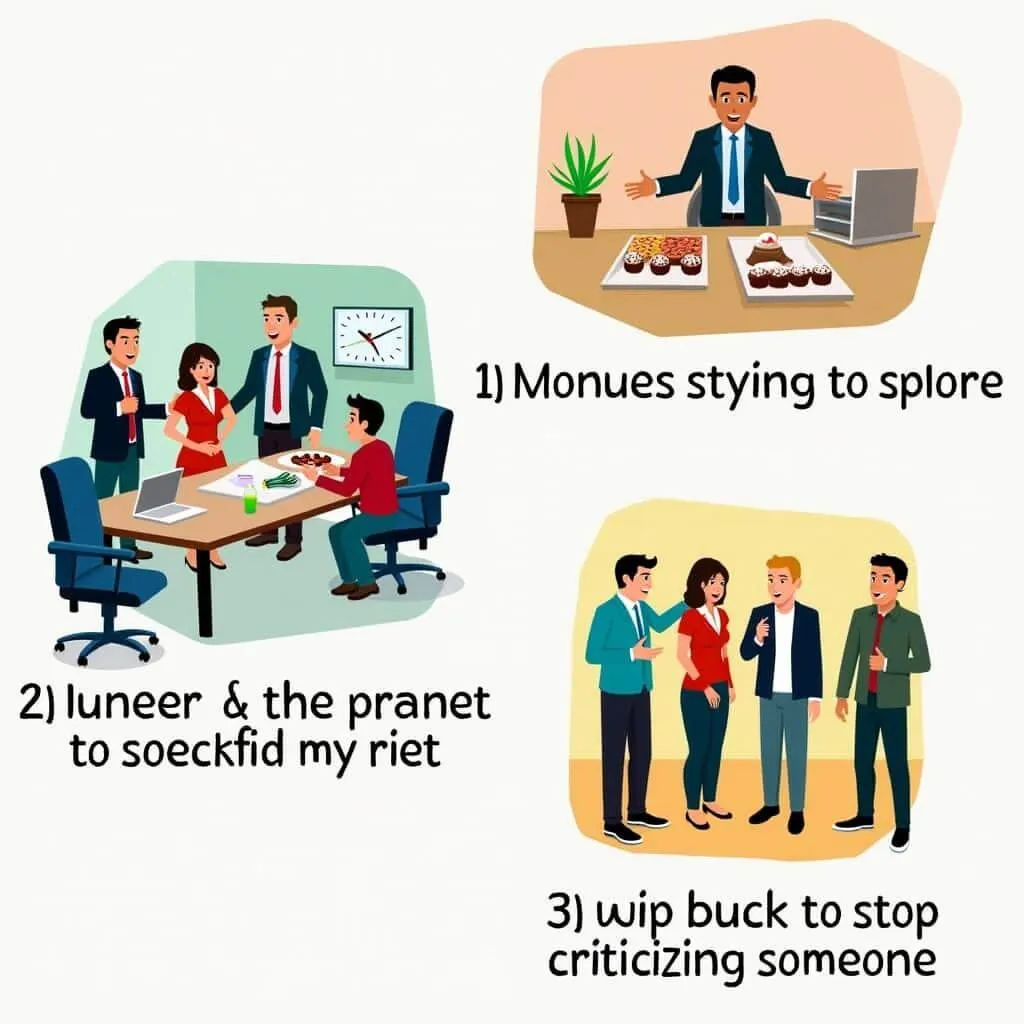What Does ‘Brush up on’ Mean?
The phrasal verb ‘brush up on’ means to review or practice something you’ve already learned in order to improve your knowledge or skills. It’s often used when someone wants to refresh their memory or update their understanding of a subject they haven’t studied or used for a while.
Nội dung bài viết
- What Does ‘Brush up on’ Mean?
- Synonyms and Related Expressions
- How to Use ‘Brush up on’ in Context
- Grammar Analysis
- Applying ‘Brush up on’ in IELTS
- In IELTS Speaking
- In IELTS Writing
- Related Phrasal Verbs
- Practice Exercises
- Fill in the Blanks
- Rewrite the Sentences
- Answers and Explanations
- Memory Tips
- Common Mistakes and How to Avoid Them
- Conclusion
Synonyms and Related Expressions
- Review
- Revise
- Refresh
- Polish up
- Touch up
- Bring up to date
How to Use ‘Brush up on’ in Context
‘Brush up on’ is commonly used in both formal and informal situations. Here are some examples:
- “I need to brush up on my Spanish before my trip to Mexico.”
- “The company offered a course for employees to brush up on their computer skills.”
- “Before the interview, I decided to brush up on the company’s recent projects.”
Grammar Analysis
‘Brush up on’ is an inseparable phrasal verb, meaning you can’t put the object between ‘brush’ and ‘up’. The structure is always:
Brush up on + object
For example:
- Correct: “I need to brush up on my English grammar.”
- Incorrect: “I need to brush my English grammar up on.”
Applying ‘Brush up on’ in IELTS
In IELTS Speaking
Using ‘brush up on’ can demonstrate your command of English phrasal verbs, which can contribute to a higher score in the Lexical Resource criterion.
Sample answer for “How do you prepare for exams?”:
“Well, I usually start by reviewing my notes and textbooks to brush up on the key concepts. I find this especially helpful for subjects I haven’t studied recently, as it allows me to refresh my memory and identify any areas where I might need additional practice.”
In IELTS Writing
While ‘brush up on’ is more common in spoken English, it can be used effectively in Writing Task 2 essays, particularly when discussing education or professional development.
Example:
“Many professionals find it necessary to brush up on their skills regularly to stay competitive in the job market.”
 Brushing up on IELTS skills
Brushing up on IELTS skills
Related Phrasal Verbs
-
Catch up on /kætʃ ʌp ɒn/: To do something you should have done earlier.
Example: “I need to catch up on my reading for the literature class.” -
Bone up on /bəʊn ʌp ɒn/: To study hard, especially for a short time before an exam.
Example: “He’s boning up on world history for the quiz tomorrow.” -
Read up on /riːd ʌp ɒn/: To study or research a subject thoroughly.
Example: “I’ve been reading up on renewable energy sources for my essay.” -
Touch up /tʌtʃ ʌp/: To improve or fix small details.
Example: “She touched up her makeup before the interview.” -
Freshen up /ˈfrɛʃ(ə)n ʌp/: To make oneself clean and tidy.
Example: “Let me freshen up before we go out for dinner.” -
Swot up on /swɒt ʌp ɒn/ (British English): To study intensively, especially before an exam.
Example: “I’m swotting up on my French vocabulary for the oral exam.” -
Gen up on /dʒɛn ʌp ɒn/ (British English): To acquire information about something.
Example: “You should gen up on the company’s history before the job interview.”
Practice Exercises
Fill in the Blanks
- Before the reunion, I decided to __ __ __ my old classmates’ names.
- The musician needed to __ __ __ his guitar skills before the concert.
- It’s a good idea to __ __ __ local customs before traveling to a new country.
- The doctor advised me to __ __ __ first aid techniques.
- Students often __ __ __ vocabulary before an English test.
- I need to __ __ __ my presentation skills before the conference.
- She’s __ __ __ her French for her upcoming trip to Paris.
- The team took a refresher course to __ __ __ the new software features.
- It’s important to __ __ __ road rules periodically to stay safe while driving.
- The actor had to __ __ __ his lines before the rehearsal.
Rewrite the Sentences
-
I need to review my math skills.
I need to __. -
She’s refreshing her memory on Spanish grammar.
She’s __. -
They should update their knowledge of current affairs.
They should __. -
We’re revising the company policies before the audit.
We’re __. -
He’s practicing his public speaking techniques.
He’s __. -
The team is reviewing the project details.
The team is __. -
I’m updating my computer skills for the new job.
I’m __. -
They’re revising the emergency procedures.
They’re __. -
She’s refreshing her memory on the historical dates.
She’s __. -
We need to practice our presentation skills.
We need to __.
Answers and Explanations
Fill in the Blanks:
- brush up on
- brush up on
- brush up on
- brush up on
- brush up on
- brush up on
- brushing up on
- brush up on
- brush up on
- brush up on
Rewrite the Sentences:
- I need to brush up on my math skills.
- She’s brushing up on her Spanish grammar.
- They should brush up on their knowledge of current affairs.
- We’re brushing up on the company policies before the audit.
- He’s brushing up on his public speaking techniques.
- The team is brushing up on the project details.
- I’m brushing up on my computer skills for the new job.
- They’re brushing up on the emergency procedures.
- She’s brushing up on the historical dates.
- We need to brush up on our presentation skills.
Explanation: In all these sentences, ‘brush up on’ is used to indicate reviewing or practicing something already learned to improve knowledge or skills. The phrasal verb remains inseparable, and the object always follows ‘on’.
Memory Tips
To remember ‘brush up on’, visualize brushing dust off an old book before reading it. This image represents refreshing old knowledge, which is exactly what ‘brush up on’ means.
Another memory aid is to think of ‘brushing’ your brain with new information, like brushing your teeth to keep them clean and fresh.
 Visual memory aid for 'brush up on'
Visual memory aid for 'brush up on'
Common Mistakes and How to Avoid Them
-
Incorrect word order: Remember, ‘brush up on’ is inseparable. Never put the object between ‘brush’ and ‘up’.
- Incorrect: “I need to brush my English up on.”
- Correct: “I need to brush up on my English.”
-
Omitting ‘on’: Always include ‘on’ after ‘brush up’.
- Incorrect: “She’s brushing up her presentation skills.”
- Correct: “She’s brushing up on her presentation skills.”
-
Using with new skills: ‘Brush up on’ is for refreshing existing knowledge, not learning new skills.
- Incorrect: “I want to brush up on Chinese, which I’ve never studied before.”
- Correct: “I want to brush up on my French, which I studied years ago.”
-
Overuse in formal writing: While acceptable in IELTS Writing, avoid overusing it in very formal academic writing.
Conclusion
Mastering phrasal verbs like ‘brush up on’ can significantly enhance your IELTS performance. It demonstrates a nuanced understanding of English and can help you express ideas more precisely and naturally. Remember to practice using ‘brush up on’ in various contexts, and don’t forget to brush up on other phrasal verbs as well! Regular practice will help you catch up with native-like fluency and pick up new expressions effortlessly. Keep working on your language skills, and you’ll find that acing the IELTS will become your cup of tea in no time!


